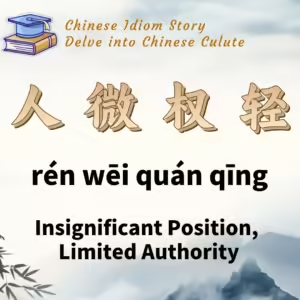
Chinese Idiom: 尽善尽美 (Jin Shan Jin Mei)
English Translation: Perfect and flawless
pīn yīn: jìn shàn jìn měi
Idiom Meaning: This idiom describes something that is perfect and without any flaws.
Historical Source: 《论语·八佾》 (The Analects of Confucius · Chapter on the Eightfold).
Idiom Story:
Confucius lived during the Spring and Autumn period, a time of significant social upheaval. Born into a poor family with low social status, he began his career as a minor official managing warehouses and pastures. His exceptional work eventually led to his promotion to Sikong, a senior position.
Later, Duke Zhao of Lu sent Confucius to Luoyang, the capital of the Zhou dynasty, to study rituals. While there, he visited the renowned philosopher Laozi (Li Er), who imparted wisdom on the importance of humility and selflessness. Laozi advised Confucius to avoid excessive cleverness and criticism of others, emphasizing loyalty to family and rulers.
Upon returning to Lu, Confucius gained many students, but when he was thirty-five, political turmoil forced him to seek refuge in the Qi State, where he served as a minister to Gao Zhaozi. During his time there, he had an encounter with musicians and heard the beautiful Shaoyue music, which moved him deeply.
The Analects records his experience:
“子在齐,闻《韶》,三月不知肉味。曰:‘不图为乐之至于斯也。’”
(Translation: “While in Qi, Confucius heard the Shaoyue music and was so enchanted that for three months he could not even taste meat. He remarked, ‘I never imagined music could reach such heights.'”)
In Qi, Confucius also enjoyed the Wuyue music from the time of King Wu of Zhou. He made a comparison, stating:
“子谓《韶》,‘尽美矣,又尽善也。’谓《武》,‘尽美矣,未尽善也。’”
(Translation: “He said of the Shaoyue: ‘It is perfectly beautiful and perfectly good.’ Of the Wuyue: ‘It is perfectly beautiful, but not quite good enough.'”)
Confucius’s evaluations of the two pieces of music carried political implications. He believed that Yao had passed his throne to Shun, hence the music from Shun’s era was not only melodically exquisite but also contained profound moral content. In contrast, the Zhou dynasty’s rule, having come about through conquest, lacked the same purity of purpose, and thus its music was deemed less virtuous.
From Confucius’s reflections on music, the idiom “尽善尽美” emerged, highlighting the ideal of achieving perfection and excellence in all aspects.






